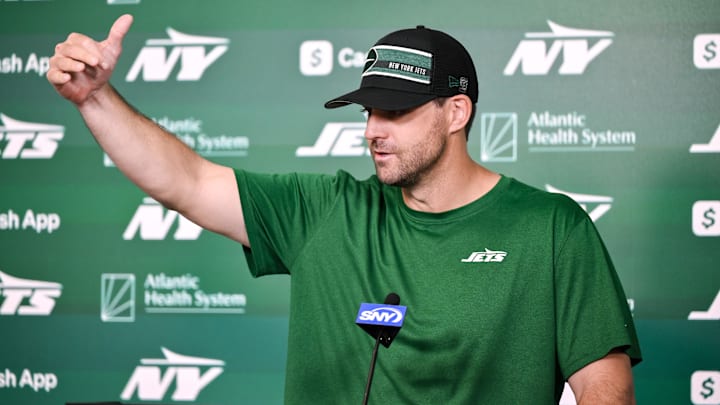The New York Jets were grounded against the Buffalo Bills. It seemed almost as if Bills head coach Sean McDermott and the defense knew what was coming in their 30-10 shellacking of the Jets last Sunday.
Indeed, the Bills had picked up on something. They mercilessly run-blitzed the Jets, sending their corners on early downs and begging Justin Fields to beat them with his arm. Fields responded by putting up the worst performance of his career, going three-for-eleven for 27 yards through the air.
Establish the run. The old football adage has become something of a mantra for the Jets throughout the years, spanning different regimes in the process. On Sunday, however, the Jets running backs contributed just 40 rushing yards on 12 carries, struggling mightily to the tune of 3.3 yards per carry.
Jets offensive coordinator Tanner Engstrand needs to fix this fatal flaw
The reason the Bills' defense seemed to know what was coming was simple: they just knew. No, this isn't some new Spygate scandal, but rather some thorough research of the Jets' tendency to uncover a pattern.
The New York Jets run the ball on early downs more frequently than any team in the league, by a wide margin, in situations when the score and game situation don't dictate the play call. Essentially, the Jets throw the ball on first and second down just 35 percent of the time outside of situations where the score takes the run off the table.
That led Buffalo to sell out against the run, knowing that the Jets weren't even going to attempt to throw and make them pay for blitzing from the cornerback position.
This run-run-pass style of offense has long been a bugaboo, since the Rex Ryan days. It often put the team in third-and-long situations that have been tough to convert, and telegraphs their intent to opposing defenses on a regular basis.
Frankly, what we've seen so far is a stark contrast to the fast-paced, up-tempo, and aggressive style Tanner Engstrand promised when he came over with Aaron Glenn and ascended to the offensive coordinator role.
The Jets are in a tough position here. They're lacking talent and depth at the wide receiver position behind Garrett Wilson. Their tight end room has potential, but it seriously lacks experience. Their starting quarterback has never been able to put the flashes together into consistent play, and his injury has forced their backup in to start Week 3.
All of those issues have been present across Jets rosters for most of the last 15 years, with a brief exception of the high-flying receiver corps headed by Brandon Marshall and Eric Decker back in 2015. Yet, those issues are magnified even more when a conservative, vanilla, and predictable game plan is utilized week after week.
Tanner Engstrand is new to this role of being the chief offensive architect, but he's going to need to learn quickly that the reins need to be loosened a bit in order to have success. Sunday against the Buccaneers will be a key measuring stick for how quickly he adapts, if he ever does.
